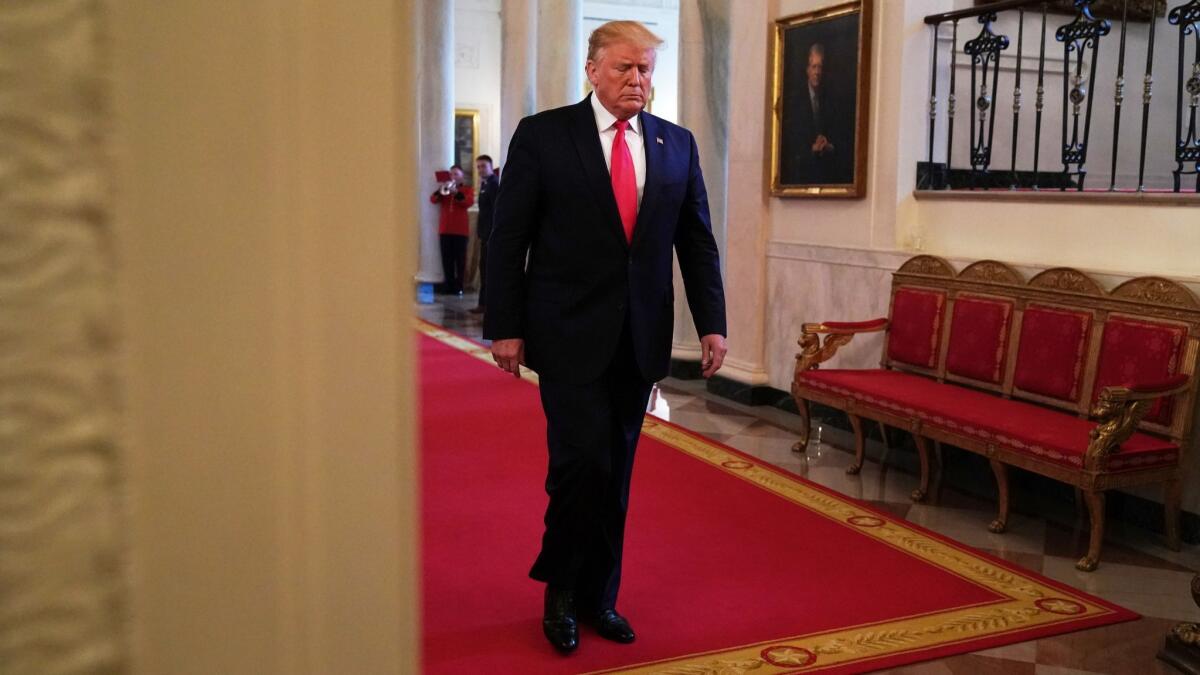Trump again claims he would consider foreign help for his campaign

- Share via
Reporting from Washington — Seeking to stem a bipartisan furor, President Trump said Friday that he would “of course” contact the FBI if a foreign government gave him dirt on his political opponents — but not until after he looked at it first.
“If you don’t hear what it is, you’re not going to know what it is,” Trump told Fox News. “I mean, how can you report something that you don’t know?”
Trump’s revised stance did little to assuage critics who warned the president is setting the country up for a repeat of the foreign interference in the 2016 election that led to a lengthy special counsel investigation, multiple congressional inquiries and widespread concerns about the integrity of U.S. elections.
Special counsel Robert S. Mueller III concluded that Kremlin-backed operatives interfered in the 2016 election in a “sweeping and systematic” effort that was ultimately aimed at benefiting Trump. In addition to extensive contacts with senior Trump aides, Russians released stolen Democratic Party emails and spread divisive disinformation on social media.
Trump’s willingness to accept foreign help in the 2020 race drew a chorus of criticism by elected officials, legal scholars and historians, who argued that Trump was undermining long-established norms of U.S. politics and in danger of violating federal law.
“It’s certainly clear, even after the turmoil of the last two years, the president hasn’t learned anything, or if he’s learned something, he’s learned the exact wrong lesson,” said Rep. Adam Schiff (D-Burbank), chair of the House Intelligence Committee. “He’s learned that he can accept foreign help and still escape the law.”
Trump said it’s OK to take campaign dirt from foreign powers. Is it legal? »
The controversy began Wednesday after Trump told ABC News that he might not tell the FBI if a foreign government offered his campaign derogatory information on a rival.
“It’s not an interference [if] they have information,” he said. “I think I’d take it. If I thought there was something wrong, I’d go maybe to the FBI.”
That set off alarms all day Thursday on Capitol Hill, with Democrats expressing outrage and Republicans distancing themselves from the president’s position. Federal law expressly prohibits foreigners from making gifts to U.S. political campaigns.
Although he refused to admit fault, he initially said his remarks were mischaracterized, a gambit that fell through when ABC released the full transcript of what he said.
On Friday, he sought to amend his comments during a phone-in interview on “Fox & Friends,” the president’s favorite morning show and a reliable destination for softball interviews.
Trump said he doesn’t “think anybody would present me with anything bad because they know how much I love this country.” But he added that if they did, he’d hear them out.
“If I don’t listen, you’re not gonna know,” Trump said. “Now, if I thought anything was incorrect or badly stated, I’d report it to the Attorney General, the FBI. I’d report it to law enforcement, absolutely.”
The caveat didn’t convince his many critics.
Max Bergmann, who directs the Moscow Project at the Center for American Progress, a Washington think tank, said Trump viewed his campaign’s contacts with Russia in 2016 as appropriate and saw no reason to change.
In Trump’s view, “If they didn’t get me then, then what I do in 2020 is going to be no different,” Bergmann said.
In his ABC interview, Trump directly contradicted FBI director Christopher Wray, who testified to Congress last month that campaigns should immediately report contacts with foreigners who want to influence an election. Wray, Trump said, “is wrong.”
Wray has not publicly responded, but former FBI officials described the president’s put-down of the director — and his twice-declared willingness to consider foreign help for his campaign — as troubling.
“If President Trump is willing to entertain a conversation, foreign intel services love that,” said Stephanie Douglas, a former executive assistant director of the FBI national security branch. “It just makes him more vulnerable, and it makes the job of the FBI much harder.”
More to Read
Get the L.A. Times Politics newsletter
Deeply reported insights into legislation, politics and policy from Sacramento, Washington and beyond. In your inbox twice per week.
You may occasionally receive promotional content from the Los Angeles Times.











